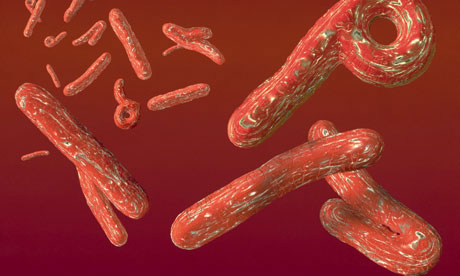|
查看原文
In case you’ve missed it, the deadliest Ebola outbreak is spreading in Western Africa, taking at least 900 lives so far. The US Centers for Disease Control and Prevention (CDC) is sending 50 infectious disease specialists to the region in order to help quell the outbreak and provide much-needed resources and expertise. As the outbreak worsens, confusion—and panic—has grown.
To sort fact from doomsday fiction, we consulted current and former CDC members and infectious disease experts including Dr. Ron Behrens, of the London School of Hygiene & Tropical Medicine, and Amesh Adalija an infectious disease physician at the University of Pittsburgh Medical Center. Here are answers to common burning questions.
Where does the name “Ebola” come from?
The virus is named after the Ebola River in what is now the Democratic Republic of the Congo.That’s where the virus was discovered in 1976.
If there’s no vaccine or cure, what are doctors doing to treat Ebola patients?
For now, all doctors can do is treat the symptoms and provide supportive care like monitoring heart rate, blood pressure, and breathing while making sure the patients’ fluids are replenished. Sometimes patients are given antibiotics to treat other possible infections. The hope is to sustain the patient through the infection so their immune system can eventually clear the virus. This is harder to achieve in rural health systems in West Africa that are tasked with treating thousands of patients with insufficient resources.
How do some people recover if there’s no cure?
When the body is infected with a virus, it starts creating antibodies to attack it. The people who survive Ebola—or any virus—have created enough antibodies to neutralize it.
I hear you can only get Ebola through direct contact with an infected person’s bodily fluids. Does that mean you need to have an open wound or something?
A wound, sure, but the skin can also have microabrasions you can’t see. Additionally, the virus can get into your body through your eyes and mouth if those areas come into contact with something that contains the bodily fluids of an infected person. That’s why health care workers are supposed to keep themselves completely covered while treating patients. The doctors and health care workers in West Africa are working in rural clinics, where the proper protections are scarce. Infected people may be quarantined with other people infected with the disease, making this kind of contact easier.
Since the virus has a two-to-21-day incubation period, can you get the disease from someone who doesn’t have symptoms?
No. The CDC says people who are not symptomatic are not contagious.
Can Ebola spread through sweat?
Yes, the virus can be present in sweat.
What about sex?
Sure, though sex while infected with Ebola seems unlikely. In past Ebola outbreaks, men who survived the disease were told to refrain from sex or use condoms for about three months after recovery because the virus can be present in semen.
Why is there no vaccine or drug for Ebola?
There are several promising drugs and vaccines in development, but since Ebola is less common—and research about it is not well funded—there is no drug or vaccine that has been approved for use in humans. One experimental serum was used by the two American patients, but there’s not enough for widespread use yet. Many of the other drugs and vaccines have not yet been tested in humans. The WHO is meeting next week to discuss whether experimental treatments should be used during this outbreak.
What does the virus do to the human body?
The virus is systemic. That means it can move to and affect every part of the body causing direct damage to organs as well as internal bleeding. This causes shock, which drops a person’s blood pressure and causes multisystem organ failure.
How were the two American patients brought to the US safely?
The two Americans were evacuated out of Liberia in special planes equipped with the necessary medical equipment to sustain their health and keep them isolated. After the plane landed, they were taken in a similarly equipped ambulance to Emory University Hospital, which has a specially built isolation unit meant to treat patients who have been exposed to severe infectious diseases. For more details on their travel as well as photos, read TIME’s coverage of the travel here.
Why is it spreading so fast in Africa?
CDC director Dr. Tom Frieden has said that the health systems in Guinea, Sierra Leone and Liberia are severely lacking in resources, and health care workers may not have access to adequate protective clothing. There’s also been some pushback against healthcare workers. Since Guinea, Sierra Leone and Liberia share a border, it’s easier for people to move from one country to another, and increasing the risk for disease spread.
How did the virus start anyway?
The natural reservoir for Ebola remains unknown, but researchers hypothesize that the first infected in an outbreak likely becomes infected through contact with an infected animal. Bats are thought to be a carrier of the virus.
I am terrified about an outbreak in the US Am I overreacting?
Yes. The outbreak is happening in rural areas of developing countries. There’s a slim chance someone with Ebola could travel to the United States. If that happens, experts say that any hospital in the US would be able to successfully isolate them. The CDC says there will not be a spread of the virus akin to what we have seen in Guinea, Sierra Leone and Liberia because we have many ways to isolate a patient and treat their symptoms.
|
查看譯文
據(jù)《時(shí)代》周刊網(wǎng)站報(bào)道,現(xiàn)在,最致命的埃博拉(Ebola)病毒正在西非大地上蔓延,目前已造成至少900人死亡。美國疾病控制與預(yù)防中心(CDC)正向該地區(qū)派遣50名傳染病專家以控制疾病的進(jìn)一步爆發(fā)并提供繼續(xù)資源和專業(yè)知識。隨著事態(tài)每況愈下,困惑和恐慌也與日俱增。
為了同末日小說的場景相區(qū)分,我們咨詢了包括倫敦大學(xué)衛(wèi)生和熱帶醫(yī)學(xué)學(xué)院(London School of Hygiene&Tropical Medicine)的羅恩·貝倫斯博士(Dr. Ron Behrens)以及匹茲堡大學(xué)醫(yī)學(xué)中心傳染病醫(yī)生阿米什·阿達(dá)利亞(Amesh Adalija)在內(nèi)的現(xiàn)任和前任疾控中心成員和傳染病專家,以聽取他們的意見。
以下便是關(guān)于埃博拉病毒常見問題的回答:
“埃博拉”這個(gè)名字起源何處?
埃博拉這個(gè)名字源于剛果民主共和國境內(nèi)的一條同名河流。那里正是1976年埃博拉病毒被首次發(fā)現(xiàn)的地方。
如果沒有疫苗和治愈藥品,那么醫(yī)生怎么治療埃博拉病毒感染患者?
就目前來看,醫(yī)生們能做的便是治療當(dāng)下癥狀并向患者提供如監(jiān)測心率、血壓、呼吸等維持療法并確保患者的體液充足。有時(shí)患者可能會(huì)通過注射抗生素來治療其他可能的感染,治療的希望即在感染中維持患者生命體征從而使他們的免疫系統(tǒng)能夠最終消除病毒。承擔(dān)著在資源不足條件下治療成千上萬民患者的壓力,這樣的目標(biāo)很難在西非農(nóng)村衛(wèi)生系統(tǒng)中得以實(shí)現(xiàn)。
在沒有治療藥品的條件下,有些人是怎么自行恢復(fù)的?
當(dāng)一個(gè)人感染了病毒之后,人體自身便會(huì)產(chǎn)生抗體來攻擊病毒。那些感染埃博拉或是其他病毒卻能自行恢復(fù)的人是在自身產(chǎn)生足夠抗體之下才得以恢復(fù)。
我聽說只有與感染者體液直接接觸后才會(huì)感染上埃博拉病毒。這是不是意味著有裸露的傷口或是其他傷就會(huì)感染?
傷口是必然會(huì)感染的,還有皮膚上一些你看不到的細(xì)微擦傷也會(huì)導(dǎo)致感染。此外,病毒也可以從你與感染者的體液接觸,通過眼睛和嘴巴進(jìn)入你的身體。這就是衛(wèi)生工作者們在對患者進(jìn)行治療的同時(shí)會(huì)把自己全副武裝起來的原因。在西非的醫(yī)生和衛(wèi)生保健工作者們一般都在農(nóng)村診所工作,而診所所能提供的保護(hù)措施非常稀有,感染者可能只會(huì)和其他疾病的感染者隔離起來,這就使得傳染更為容易。
由于埃博拉病毒潛伏期為2—21天,那些并沒有顯示出癥狀的人會(huì)傳染病毒么?
不能。疾控中心表示沒有癥狀的人還不具有傳染病毒的可能。
埃博拉病毒能通過汗液傳播嗎?
當(dāng)然,病毒能夠夾雜在汗液中傳播。
埃博拉病毒會(huì)通過性傳播感染嗎?
雖然通過性傳播傳染埃博拉的可能性似乎不太大,但是性傳播還是存在的。在過去幾次埃博拉病毒爆發(fā)中,那些從病毒之下脫離虎口的人都曾告誡在康復(fù)后3個(gè)月應(yīng)避免性生活或是使用避孕套,這是由于病毒可能會(huì)存活在精液之中。
為何還未研制出埃博拉病毒的疫苗或藥物?
有幾種前景良好的藥物和疫苗還處于研發(fā)之中,但由于埃博拉病毒極為罕見且研究資金不足,因此用于人體的疫苗還尚未獲得批準(zhǔn)。兩名美國患者正在試用實(shí)驗(yàn)血清但也沒有獲得足夠的推廣。許多其他藥物和疫苗也尚未在人體得以測試,世界衛(wèi)生組織將在下周開會(huì)討論在疫情爆發(fā)的這段時(shí)間中是否應(yīng)當(dāng)使用實(shí)驗(yàn)性治療手段。
病毒會(huì)對人體造成怎樣的影響?
病毒是系統(tǒng)性的,這就意味著它可以在身體各個(gè)部位移動(dòng),影響部位器官從而造成內(nèi)出血等直接損傷。這會(huì)導(dǎo)致人體休克,血壓下降,最終導(dǎo)致多系統(tǒng)器官衰竭。
兩名美國患者是怎樣安全帶回美國的?
兩名美國人乘坐醫(yī)療設(shè)備齊全的專機(jī)撤離利比里亞從而維持身體健康并保持隔離。在飛機(jī)著陸之后,他們被帶上了同樣配備的救護(hù)車送往埃默里大學(xué)醫(yī)院(Emory University Hospital),在醫(yī)院中為嚴(yán)重傳染病人而設(shè)立的隔離單元中進(jìn)行隔離治療。
為何在非洲能傳染得如此之快?
疾控中心主任湯姆·弗萊登博士(Tom Frieden)表示幾內(nèi)亞,塞拉利昂和利比里亞的醫(yī)療資源嚴(yán)重缺乏,醫(yī)護(hù)人員也無法獲得充足的防護(hù)服裝備。對于醫(yī)護(hù)人員而言,也存在一些操作阻力,由于幾內(nèi)亞,塞拉利昂和利比里亞三國共享邊境,人們很容易從一個(gè)國家便遷移到另一個(gè)國家,這樣就會(huì)增加疾病傳播的風(fēng)險(xiǎn)。
病毒究竟是怎樣開始傳播的?
埃博拉病毒的自然宿主仍然未知,但是研究人員推測第一次感染暴發(fā)很有可能是通過接觸感染病毒的動(dòng)物而傳染的。而公認(rèn)蝙蝠是埃博拉病毒的載體。
我很擔(dān)心埃博拉病毒在美國暴發(fā),這樣是不是反應(yīng)過度?
是的。此次病毒暴發(fā)發(fā)生在發(fā)展中國家的農(nóng)村地區(qū),因此埃博拉病毒感染者到美國來旅游的機(jī)會(huì)可謂渺茫。如果出現(xiàn)這種情況的話,專家們表示美國任何一家醫(yī)院都能將患者成功隔離。疾控中心也表示就目前我們在幾內(nèi)亞,塞拉利昂和利比里亞看到的情況,由于我們有很多方法來隔離病人,治療病癥,因此病毒不會(huì)就此傳播下去。
(譯者 Enchant_ed 編輯 丹妮)
掃一掃,關(guān)注微博微信
 
|


